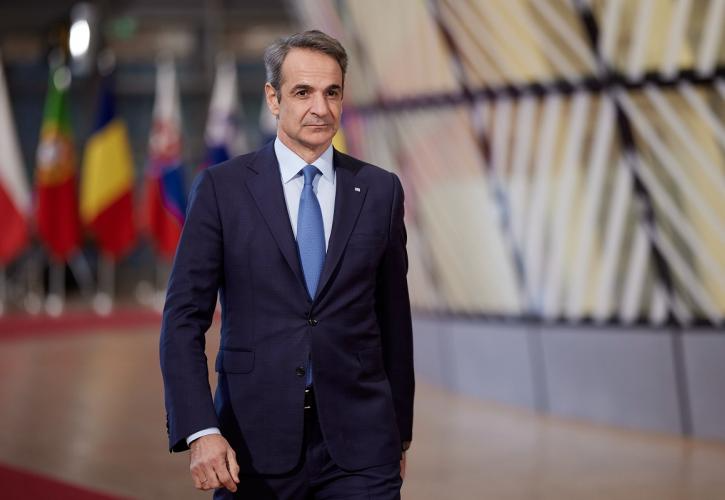
"European policy on migration has come closer to the Greek position," the Prime Minister said from Brussels after the end of the Summit and clarified that a European framework is being launched, according to which anyone who is not entitled to asylum should be returned to their country of origin.
Prime Minister Mitsotakis said at the press conference after the conclusion of the summit and asked about the migration issue: "First of all, the fact that we managed to reach agreement on the conclusions on the migration chapter is a very positive development. And if I may make a more general observation, Greece has been defending a strict but fair migration policy since 2019, with a strong emphasis on the external dimension of migration, that is, the protection of the external borders of the European Union. And the problems that Poland is currently facing with the instrumentalisation of the migration problem by Belarus and Russia—Greece was the first to face them, I want to remind you—in March 2020. We are showing full support to a country that is facing similar problems. But over the years, Europe's policy on migration has changed and has come much closer to the Greek position. And this is now a self-evident conclusion, which is also evident from the conclusions of the European Council itself. The external dimension of migration, the protection of European borders, and the Pact on Immigration and Asylum are Europe's successes and are positions that are close to the Greek positions. Europe has taken a decision. It is a decision, which obviously also serves Greek interests, that it is not possible for traffickers to determine who enters the European Union, and what we are now coming to complete as a next step is to launch a European framework for returns. Because our argument will only be complete if we say that we determine who wants to enter the European Union, but anyone who cannot and has no place in Europe because they are not entitled to asylum must return to the country from which they came. And this is precisely the subject of the directive that we have given to the European Commission to quickly develop new European legislation on return issues. So I think that Europe is slowly but surely moving in the right direction and in a direction that certainly serves the Greek position as well."
ITALY'S MODEL
The Prime Minister was asked about the model followed by Italy in creating closed centres in Albania and whether he would be in agreement if European legislation were to change with such a practice and what he would propose in return. Mitsotakis replied as follows: "First of all, let's be clear about what Italy does and does not do. Obviously, every country has its own particularities. It is a new, interesting solution, I would say, and I did not reject it in any way for those cases of migrants who are collected in international waters. Greece does not have such issues and whose asylum applications will be processed in Italy on the basis of Italian law. However, these people will eventually, in one way or another, pass through Italy again. Let me stress that this is a bilateral agreement between Italy and Albania and is not a decision that, at this level, has a European dimension. What is of value, and I can say that in Mrs. von der Leyen's letter on returns, there is a sentence that we will also look at innovative solutions. And among the innovative solutions that can be considered is this idea of centres outside the European Union to which migrants whose asylum applications are rejected if they cannot be returned directly to their countries of origin will be sent. This is still an idea; it has not been developed. In principle, I find it positive, and obviously, when we see the specific proposals of the European Commission, we will be able to take a position."
EU-Turkish agreement
On the EU-Turkey agreement which provided for returns which did not take place, Mitsotakis said: "It is correct what you point out. You are right. However, you are right to point out that returns to Turkey are not taking place and should take place. And obviously this is an issue that we are concerned about, we are raising it in Turkey, we are not the only ones raising it, and I think it is an issue that we must insist on. Greece is doing returns, but I want to stress that returns are a difficult process overall, not only for Greece but for the European Union. Statistically, only one in five of those who have to return to their countries of origin actually do so, and that is why it is so important that Europe and the European Council come and recognize this problem and say essentially—to put it very simply—that if you are not entitled to enter Europe, you must return. And that is the only way that we can send a message to both traffickers and those who know that they are not entitled to asylum, that if they come to Europe they have an increased chance of returning to the country from which they came. It is an absolutely correct policy; Greece has insisted for many years on this dimension, which I stress is coming to complement with legal migration agreements and bilateral agreements, such as the ones that Greece has. However, once more, we and not the traffickers decide the circumstances in which an economic migrant will arrive. If you enter the European Union illegally, there must be a way to get back to the country you started in. To put it very simply and very simplistically, I would say that this is the meaning of this new effort that we have to make as the European Union and which must also complement legislatively, as you know, the Pact on Immigration and Asylum, because we have left this chapter out.






